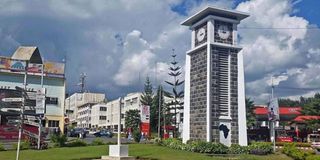Arusha City doubles revenue to Sh51 billion, sets sights on modern Markets and infrastructure

With 21 international organizations having their headquarters in the city and its close proximity to world-renowned tourist attractions, Arusha has cemented its status as an important global hub. PHOTO | FILE
What you need to know:
- Among the council’s key interventions has been the disbursement of Sh10.3 billion in low-interest loans to 862 community groups.
Arusha. Arusha City Council has recorded a remarkable fiscal milestone, more than doubling its annual revenue to Sh51 billion in the 2024/25 financial year—up from just over Sh21 billion in 2020/21.
The growth, according to His Lordship Mayor Maximilian Iranghe, is the result of an aggressive push to diversify revenue sources, improve efficiency, and invest in economic infrastructure to fuel long-term sustainability.
Speaking during a media briefing at the City Hall, Mayor Iranghe said the council’s achievements are the product of deliberate reforms implemented during his four-year tenure, which officially ends with the dissolution of the council on June 28, 2025.
“We focused on modernising our markets, expanding revenue collection centres, and empowering local entrepreneurs. These interventions are beginning to pay off,” he told reporters.
Capital access driving economic inclusion
Among the council’s key interventions has been the disbursement of Sh10.3 billion in low-interest loans to 862 community groups. These included 624 women’s groups, 58 for people with disabilities, and 180 youth groups, aimed at promoting inclusive economic participation and enhancing local tax compliance.
“These soft loans have helped small traders expand their capital base, formalise their businesses, and contribute to the city’s economic cycle,” said Iranghe.
Infrastructure boost
Over the past four years, the Arusha City Council has secured a total of Sh400 billion in funding, enabling the implementation of several key development projects across the city. Among the major achievements is the expansion of education infrastructure, with the number of primary schools increasing from 47 to 51 and secondary schools rising from 26 to 32.
In the area of transport and security, the council has constructed 20 kilometres of tarmac roads and installed streetlights and surveillance cameras to improve road safety and urban mobility.
The health sector has also seen significant investment, including the construction of a new district hospital, the establishment of several additional dispensaries, and the provision of modern medical equipment to Kaloleni Health Centre, all aimed at improving access to quality healthcare for residents
Market reforms to drive future revenue
With the council’s mandate nearing its end, Iranghe said plans are in place to maintain the momentum through strategic infrastructure projects, including the development of modern markets at Mrombo and Kilombero, upgrades to the small bus terminal shops, and the city’s football training grounds.
He said the Mrombo market, famous for its goat meat roasting stalls, is being repositioned as a high-potential commercial hub. Its modernisation is expected to boost local trade and create new revenue streams.
The small bus terminal, currently accommodating around 400 traders and generating Sh1.2 billion annually, is set for expansion. Once upgraded, it is projected to house up to 2,000 traders and generate more than Sh6 billion per year.
“These projects are not just about infrastructure—they’re about raising the city’s economic profile and improving livelihoods,” said Iranghe.
Citizens demand more action on roads
Despite the successes, discontent is simmering among residents who say little has been done to address poor roads in several neighbourhoods. In recent weeks, some communities have staged protests and blocked roads, demanding urgent repairs.
The demonstrations come just two months after the council invested Sh1.7 billion in road construction equipment and allocated Sh4 million per ward for gravel purchases and minor road works.
“We’ve seen the equipment, but the roads are still impassable. We’re tired of promises and want visible change,” said Rehema Mbise from Sokoni I Ward.
In contrast, some residents, such as Amina Ramadhani from Muriet, welcomed the city’s efforts to improve markets like Mrombo, urging leaders to prioritise delivery over pledges.
“The market upgrade will benefit many of us, but we need action—not just speeches,” she said.
DC urges leaders to stay engaged
In response to the growing frustrations, Arusha District Commissioner Joseph Mkude called on local leaders to proactively engage with communities and resolve issues before they escalate.
“Let’s not wait for protests to start addressing concerns. Hold regular meetings, explain project timelines, and prioritise urgent interventions—especially in areas affected by flooding,” he said.
He added that some delays were due to the rainy season but stressed the importance of temporary fixes, such as distributing gravel to the worst-affected roads while long-term projects resume post-rain.
As the Arusha City Council prepares to hand over to a new leadership, Mayor Iranghe said he was proud of the groundwork laid during his tenure, including efforts to enhance local revenue mobilisation, improve public services, and build an inclusive city economy.
“Some councillors may return, others will rest, but we all leave behind a legacy of growth and structural transformation. The next chapter must build on it,” he concluded.



